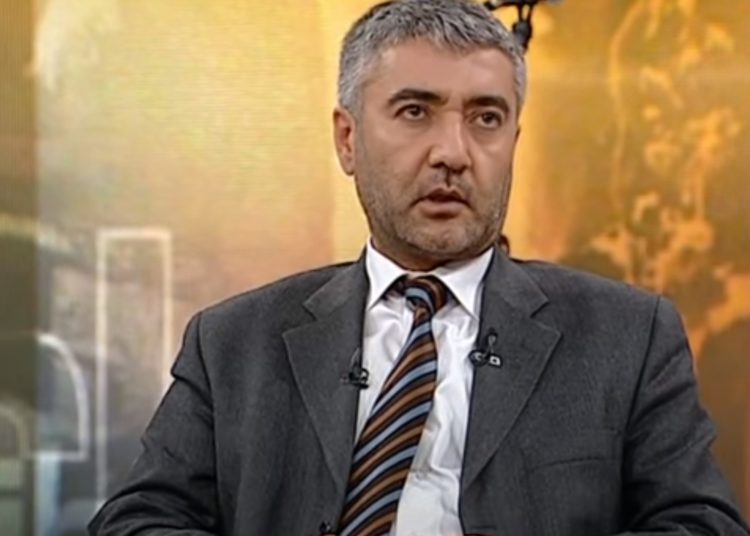Abdullah Bozkurt/Stockholm
The person responsible for shaping Turkey’s foreign policy in the Middle East in the office of President Recep Tayyip Erdogan has been revealed to have called for the destruction of Israel, as uncovered by a Nordic Monitor investigation.
Sefer Turan, a 62-year-old pro-Iranian Islamist and a chief advisor to the Turkish president, has openly denied Israel’s right to exist, stating, “We must consistently and at every opportunity inform the public that there is no such state called Israel.”
Turan’s remarks were made in June 1997 during a panel discussion concerning the closure of the Palestine Solidarity and Friendship Association (Filistin Dayanışma ve Dostluk Derneği, FDD) by Turkish authorities. The FDD was identified as a front organization sponsored by the Iranian mullah regime in Turkey, aimed at channeling funds to armed Palestinian jihadist groups, organizing rallies against Israel and promoting antisemitism in Turkey.
Turan, one of the architects of the FDD, vehemently criticized the government’s decision to shut down the organization. He also condemned the peace initiatives launched in Madrid in 1991 that aimed to foster peace between Israel and Palestine, along with several Arab nations. The Madrid conference, co-sponsored by the US and the Soviet Union, eventually resulted in the signing of the Oslo I Accord in 1993 and the peace treaty between Jordan and Israel in 1994.
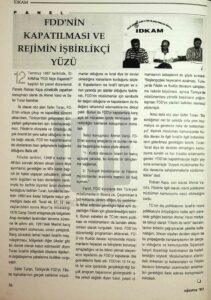
“We must openly reveal our identity and, if necessary, endure the risks,” Turan emphasized, further stating, “Nothing ends with the closure of the FDD.”
The driving force behind the creation of the FDD was a propaganda magazine named Yörünge, which received funding from the Iranian regime and was operated by pro-Iranian Turkish Islamists. Some members of this group had undergone training by Iranian intelligence in handling arms and explosives. Turkish authorities took action against the magazine, shutting it down and initiating criminal investigations and indictments against its staff.
The application for the establishment of the FDD was initially approved on July 1, 1995, during a preliminary process and later endorsed by the Interior Ministry in November 1995. However, a month after approval, the ministry requested that the FDD halt its operations until the Cabinet reviewed the application, citing concerns regarding the mention of international operations in the founding charter, which fell under the discretion of the Cabinet. On May 7, 1997 the government officially notified the FDD of its closure.
The FDD board members included Ahmet Varol, Remzi Çayır, Rıdvan Kaya, Nurettin Şirin, Fikret Özdemir and Ahmet Ağırakça, several of whom had longstanding ties with the Iranian Islamist Revolutionary Guards Corps Quds Force.
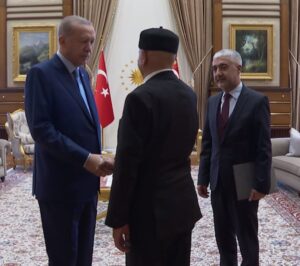
In fact, both Turan, working as chief aide to Erdogan at the time, and Şirin were suspects in a confidential investigation into the Quds Force network between 2011 and 2014. During this period their phones were tapped under court order as investigators sought to uncover an Iranian intelligence network in Turkey. The investigation aimed to determine any plots targeting Israeli, Jewish and Western interests in Turkey.
In February 2014 Erdogan intervened and halted the Quds Force investigation before prosecutors could bring charges and indict the suspects, including Turan, effectively sparing his aide from criminal prosecution and facilitating the escape of Iranian spies from Turkey.
Turan’s dedication to the destruction of Israel was further evidenced during an event hosted on March 11, 1994 by the Iranian Consulate General in Istanbul. At this gathering he praised Ayatollah Ruhollah Khomeini and echoed the call to eradicate Israel from the face of the earth.
At the time Turan was the managing editor of a weekly propaganda newspaper called Selam, a mouthpiece for the Iranian mullah regime that was also financed by Iranian intelligence. Selam was later shut down as part of a counterterrorism crackdown on IRGC Quds Force cells in Turkey with operatives indicted, tried and convicted in the late 1990s and early 2000s.
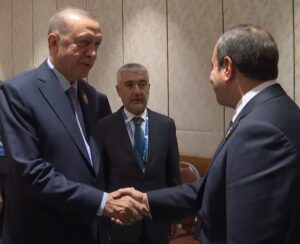
In his speech at the Iranian Consulate, Turan also criticized Arab governments, alleging that they hindered the success of armed resistance movements against Israel. “Whenever the armed Islamic Resistance Movement [Hamas] approached victory in Palestine, it was confronted by puppet Arab regimes,” he said.
Turan gave the 1994 Gaza–Jericho Agreement, also known as the Cairo Agreement, between the late Palestinian leader Yasser Arafat and then-Israeli prime minister Yitzhak Rabin as an example. He pointed out that the deal was aimed at preventing an Intifadah (Palestinian uprising).
Articles published by Turan in the 1990s also indicate his strong support for the Egyptian Islamic Jihad, which was listed by the United Nations Security Council as an al-Qaeda-affiliated group during that period.
In a series of articles primarily featured in pro-Iran publications in Turkey during the 1990s, Turan staunchly defended the terrorist group, justifying the killings of civilians and government officials in Egypt. He also criticized those who labeled the Islamic Jihad as a terrorist organization and who condemned the acts of violence perpetrated by its members.
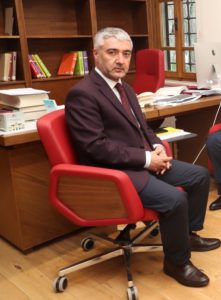
Turan has served as an advisor to Erdogan since May 2011. While rumors circulated last year suggesting his dismissal, Turan denied these claims. He continues to accompany President Erdogan during meetings with foreign leaders, particularly from the Middle East and North Africa regions.
Videos shared by the office of the Turkish president show him attending a meeting between President Erdogan and visiting Speaker of the Libyan House of Representatives Aguila Saleh in Ankara on December 13, 2023. Additionally, he was present at a private meeting held by Erdogan and Egyptian President el-Sisi on September 10, 2023, on the sidelines of the G20 summit in India.
The Erdogan government openly supports Hamas in conflicts with Israel, providing funding and hosting Hamas officials in Turkey. It grants citizenship and logistical assistance to Hamas militants. Furthermore, it facilitates the circumvention of US sanctions on Iran, a country President Erdogan has referred to as his second home.

